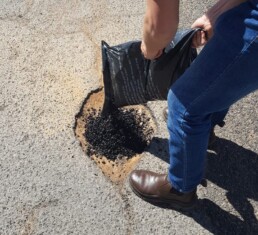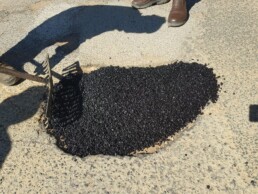Getting to know Roadsaver
Getting to know Roadsaver a little bit better
Roadsaver is a cold asphalt pothole filler which is 95% quality guaranteed. All quality standards have been adhered to, and the product has a minimum 6 -month guarantee.
Roadsaver is Proudly South African, Agrément Certified and CSIR Quality Approved.
How Roadsaver Works
These are the steps you need to follow when using Roadsaver:
- There is minimal effort needed to clean and prepare the pothole. Just remove all organic material
- Ensure that the edge of the pothole is clean
- No heating or tack coat required
- Roadsaver cold mixture works in all weather conditions
- Pour cold mixture directly into the pothole
- Cover the pothole with Roadsaver and make sure to have the entire surface covered (including the edges of the pothole)
- Even out the cold mixture
- Compact the pothole (after compaction ensure that the core of the hole is 20mm above road level)
- With additional vehicle compaction the overrun will compact further
- Open for traffic
The versatility of the product is what makes Roadsaver such a unique product. Roadsaver can be used for any of the following:
- Road potholes
- Tennis courts
- Road shoulders
- Road repairs
- Road skin patching
- Trenches
- Speed bumps
- Driveways
- Roundabouts
Hot vs Cold Asphalt - The advantages of Roadsaver
Roadsaver is a proudly South African Cold Asphalt product. Roadsaver is a long-lasting, easy and convenient product that can solve the pothole crisis in South Africa. There are various reasons as to why cold asphalt is preferred over hot asphalt. Roadsaver is truly one of kind because it is user friendly, quick to apply and cost-effective.
The table below compares Cold Asphalt to Hot Asphalt, and why this product has so much potential to solve one of the biggest problems in South Africa and many other countries.
This is why Roadsaver is the go-to pothole filler!
Hot Asphalt
- Expensive Capital equipment required during the process of working with hot asphalt
- Orders based on minimum quantity produced
- Product is required to remain heated during transportation
- Expensive vehicles required where the product needs to be held at a certain temperature
- Traffic accommodation needs to be taken into consideration when product is applied
- Road surface preparation is need prior to applying new product
- Wastage of unused material that can have cost implications
- Curing time is needed when hot asphalt is used and limits the time of normal operation and flow of traffic
- Heavy Compaction equipment required when hot asphalt is applied with a large amount of workforce and skilled labor
- Wet weather restrictions allow the limitation of making use of this product
- Skilled labour required to apply the product alongside heavy-duty machinery and vehicles
Cold Asphalt
- Economical plant and can be setup almost anyway baring spaceto set up plant
- Any quantity efficiently made; no minimum quantity required
- No specialised transport required
- Normal light duty vehicle will bemore than sufficient to transportproduct, no requirements to keep productheated
- Minimum traffic disruptions takeplace during use of cold mix
- Minimum to no preparation to bedone with ease of immediateapplication
- Unused material can be re-usedagain
- Immediate opening to traffic canbe done, as additional compacting is abonus for the setting of Roadsaver
- No heavy compaction required,Vehicular compaction on small holes will bemore than sufficient, on larger areas and trenches compaction is required
- Roadsaver can be utilised andapplied during all respective weatherconditions
- Ease of application allows for local labour and women at work,multiple teams can be used daily



